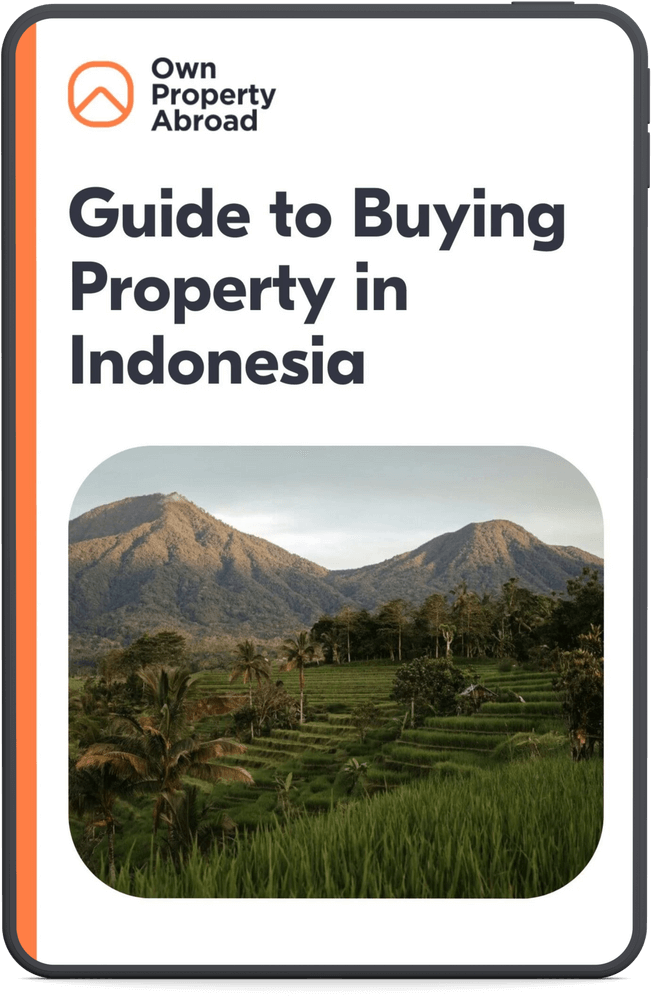What is the property rental income tax in Indonesia?
There are three property rental income taxes in Indonesia that you should know about:
- Personal Income Tax (PIT)
- Withholding Tax (PPh)
- Corporate Income Tax (CIT)
Valuable insights and practical advice, distilled from years of expertise and real-world experience.


1. Personal Income Tax (PIT)
Foreigners staying more than 183 days within a year in Indonesia are considered Indonesian tax residents. Tax residents must pay Personal Income Tax, called Pajak Penghasilan Orang Pribadi, which follows a progressive tax system based on their annual income. Indonesia’s Personal Income Tax rate ranges from 5% to 35%, depending on the yearly income.
Income generated with rental properties is taxed as Personal Income Tax unless the individual is a non-resident taxpayer. In that case, the taxpayer pays a Withholding Tax, sometimes called Rental Income Tax or Lease Tax. The PIT should be filed by March 31 of the following year, while the payment deadline is on the 10th of the following month.
The following table provides an overview of the Personal Income Tax rates for tax residents in Indonesia.
| Income | Tax rate |
|---|---|
| Up to IDR 60 million ($3,660) | 5% |
| IDR 60 million ($3,660) – IDR 250 million ($15,250) | 15% |
| IDR 250 million ($15,250) – IDR 500 million ($30,500) | 25% |
| IDR 500 million ($30,500) – IDR 5 billion ($305,000) | 30% |
| Over IDR 5 billion ($305,000) | 35% |
2. Withholding Tax (PPh)
The rental income of non-resident individuals in Indonesia is subject to a Withholding Tax of 20% of the gross rental income. Even if a non-resident has no permanent residence in Indonesia, they still need to pay taxes on any income they earn inside Indonesia. The 20% Withholding Tax is the default rate and applies unless a Double Tax Agreement (DTA) exists between Indonesia and the non-resident’s home country. The PPh should be filed by the 20th of the following month and paid by the 10th of the following month.
With a DTA, the tax rate for non-resident individuals may be reduced. The DTA helps promote cross-border trade and investment by reducing tax barriers for individuals and businesses in multiple countries. The height of the reduction varies per country.
| Withholding Tax | Tax rate |
|---|---|
| Indonesian residents | 10% |
| Non-residents | 20% |
3. Corporate Income Tax (CIT)
Corporate Income Tax rates are imposed on foreign-owned companies, known as PT PMAs. While, as a general rule, foreigners are not allowed to own properties in Indonesia, a PT PMA is one of the exceptions. An established PT PMA generally pays a flat rate tax of 22%. The CIT should be filed by April 30 of the following year, while the payment should be performed by the 10th of the next month.
| Type | Tax rate |
|---|---|
| Income from property | 22% |
Do you want to know more about property taxes in Indonesia?
This article is part of our series on Indonesian property taxes, explicitly discussing rental income tax in Indonesia. Read more about property taxes in Indonesia:
- Complete tax guide
- Taxes on buying real estate in Indonesia
- Taxes on selling property in Indonesia
- PT PMA and corporate taxes in Indonesia
Need help with rental income tax in Indonesia?
Are you unsure about rental income taxes in Indonesia? Leave your name and email below, and our experienced team will assist you with understanding, filing, and reporting your taxes accurately. You can also directly email us at [email protected]. We provide comprehensive support to ensure you comply with all tax regulations and avoid any pitfalls. Whether you need help with legalities or tax documentation, we’ve got you covered. Start your hassle-free property rental journey in Indonesia today with our personalized assistance!
Valuable insights and practical advice, distilled from years of expertise and real-world experience.


Frequently Asked Questions (FAQs)
How much is the tax on rent in Indonesia?
The tax on rent in Indonesia depends on tax residency. Indonesian tax residents pay a Personal Income Tax ranging from 5% to 35%, while non-resident individuals pay a Withholding Tax of 20% (unless a DTA is in place). Corporate Income Tax at 22% is paid if the PT PMA holds the property.
How much tax do you pay on rental income in Bali?
The tax you pay on rental income in Bali depends on the tax residency. Indonesian tax residents pay a Personal Income Tax ranging from 5% to 35%, while non-resident individuals pay a Withholding Tax of 20% (unless a DTA is in place). Corporate Income Tax at 22% is paid if the PT PMA holds the property.
Do foreigners have to pay taxes in Indonesia?
Foreigners might have to pay taxes in Indonesia. Foreigners with a foreign tax residency are only taxed by the Indonesian government on the income they earn inside Indonesia. These non-resident individuals must pay a general Withholding Tax of 20% on any income earned from sources within the country.





4 Responses
Who is responsible for paying the “lease tax” in Bali, Indonesia. Is it the responsibility of the lessor or the lessee?
Thank you,
Joel
Hi Joel,
Depends on the circumstances. If the lessee/tenant leases from a commercial company, they will pay Value Added Tax (VAT), set at 11%. No tax must be paid if the lessee leases from an individual.
Important note: The lessor always pays tax on the income they generate from leasing their land or property. This can be taxed with Personal Income Tax (if they lease as an individual) or Corporate Income Tax (if they lease as a company).
I hope this clears things up!
^ Matt
Hi there, great information thank you. I am an Australian citizen and I am looking at leasing a block of land for 25+25 years in kuri indo, which I would like to build two small surf villas to lease ie for a week or two at a time…
Is there anything I should be careful of ? I would be a non tax resident .. thank you Ben
Hi Benjamin,
It’s great to hear about your plans! When leasing land in foreign locations like Kuri Indo and planning construction, it’s crucial to be aware of local real estate, zoning, and construction laws, which differ greatly from those in Australia. Since you intend to build surf villas for short-term lease, understanding the local tourism regulations and business laws is also essential.
As a non-tax resident, you should be particularly cautious about the tax implications in Indonesia and Australia, as income generated from the villas might be subject to taxation in both jurisdictions. It’s highly recommended to consult with a local legal advisor and a tax professional who can provide guidance based on the most recent regulations and help you navigate the legal and fiscal landscape effectively. You can send us an email at [email protected] to get help with this.
Good luck with your venture!
Matt